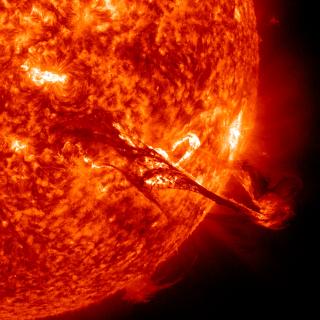Bibcode
Luna, M.; Díaz, A. J.; Karpen, J.
Referencia bibliográfica
The Astrophysical Journal, Volume 757, Issue 1, article id. 98 (2012).
Fecha de publicación:
9
2012
Revista
Número de citas
46
Número de citas referidas
43
Descripción
We investigate the influence of the geometry of the solar filament
magnetic structure on the large-amplitude longitudinal oscillations. A
representative filament flux tube is modeled as composed of a cool
thread centered in a dipped part with hot coronal regions on either
side. We have found the normal modes of the system and establish that
the observed longitudinal oscillations are well described with the
fundamental mode. For small and intermediate curvature radii and
moderate to large density contrast between the prominence and the
corona, the main restoring force is the solar gravity. In this full wave
description of the oscillation a simple expression for the oscillation
frequencies is derived in which the pressure-driven term introduces a
small correction. We have also found that the normal modes are almost
independent of the geometry of the hot regions of the tube. We conclude
that observed large-amplitude longitudinal oscillations are driven by
the projected gravity along the flux tubes and are strongly influenced
by the curvature of the dips of the magnetic field in which the threads
reside.
Proyectos relacionados

Magnestismo Solar y Estelar
Los campos magnéticos son uno de los ingredientes fundamentales en la formación de estrellas y su evolución. En el nacimiento de una estrella, los campos magnéticos llegan a frenar su rotación durante el colapso de la nube molecular, y en el fin de la vida de una estrella, el magnetismo puede ser clave en la forma en la que se pierden las capas
Tobías
Felipe García